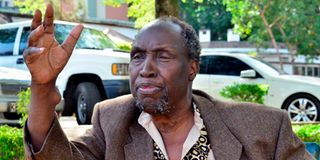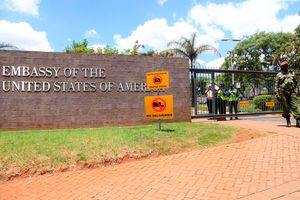
Renowned author Ngugi wa Thiong'o.
A motley group of authors, editors, accountants, managers and former staff of a publishing house and their children recently observed a minute of silence in honour of writer, teacher and thinker Ngugi wa Thiong’o.
Ngugi was not just an author at East African Educational Publishers, but also one of the shareholders of the company who ploughed a great deal of his royalties back into the publishing business. Also honoured was Rosalind Chakava, spouse of the man who published Ngugi at great personal cost.
Over the weekend, Ukombozi Library held a celebration of Ngugi’s activism at Ukumbi Mdogo, and this week at the University of Nairobi’s Taifa Hall, his publisher will host a remembrance of his life and works. Ngugi was not just a writer, but a revolutionary who worked alongside many others to create a more just Kenya.
By the time this column runs, a great deal of ink will have been spilt and many words spoken on the effect the iconic writer had on the world. The scramble for a piece of Ngugi is an indictment of how Kenya treated him in his lifetime: detained, banned and exiled.
Kenyan thinkers
Ngugi is a metaphor of the treatment that Kenya serves on its intellectuals: They are only good when dead. It is the tragedy of our times that Kenyan thinkers who were unwelcome at home have helped societies around the world resolve their issues while the country wallows in mediocrity.
Kenya, from independence, was set up to be a non-thinking, anti-intellectual enterprise that produces raw materials and cheap labour for others. When people show up with poetry and ideas, they are met with bullets and handcuffs. This hostile intellectual environment invites thinkers and those with a contrary view leave. It results in what constitutional lawyer Wachira Maina has called “civic exit”.
Over time, the hostile environment at home has driven some of the country’s finest minds to offer solutions to the world’s problems from exile. Prof Washington Okumu helped South Africa broker a deal before its elections to end apartheid; the foremost constitutional expert, Prof Yash Pal Ghai, had written constitutions for the world’s most divided societies before being invited home for our peculiar variety of bad manners. Prof Ali Mazrui put African histories on the global map while we were still examining his high school grades. Prof Wangari Maathai called the world to attention on the effects of environmental degradation even as we cloistered her in an assistant minister’s position.
Yet, those who have left with their bodies but remained connected to the umbilical cord like Ngugi are still given short shrift in the education that the country spends hundreds of billions of shillings on. Those who rule the roost by dint of earning doctoral degrees, like Dr William Ruto, spend their waking days contrasting their exceptional academic credentials with the masses’ lack of education instead of persuading them to transform society. This is the same crowd that will not tire to remind us that Ngugi did not complete his master’s degree programme.
The empty hubris of the academy, where the philosopher’s degree is more evident in the distorted meaning of the abbreviation, pull him or her down, spawns an intellectual barrenness that is hostile to new ideas. The parlous state of public universities, which have progressively moved from being graveyards of ideas to institutions that pay their striking lecturers in acres of land, is a testament of how the country has lost its way. The nation is in the grip of merchants and brokers chasing a commission while seducing scholars with the lucre of capital at a time when university enrolment is at an all-time high.
Producing employable graduates
It is not enough to speak about high university enrolment when graduates do not have space and opportunity to meaningfully participate in the economy and politics of the country. The obsession with producing employable graduates who are rule-followers capable of performing plumbing and electrician roles shortchanges the country on the great investment it continues to make in education. There is a painful dearth of intellectual rigour in the many mad-hat schemes being implemented in government—from universal health care to affordable housing and taxation.
There was a time when universities—students, workers and lecturers—were engaged in finding solutions to the issues the society was confronting. Debate produced disagreement, but also consensus. When this country has looked to its intellectuals to find solutions to its problems, it has never come up short. Examples abound: in the economic recovery under Mwai Kibaki; the methodological approach to tackling HIV and Aids; and the creation of Vision 2030. Kenya’s untapped intellectual resource offers a ray of hope out of the morass of grasping ambition that has come to define the country.
Ngugi’s last revenge on Kenya was to refuse to be put down in the ground where we can tread on his remains. Whatever platitudes we may speak in his memory, the fact that the Culture Bill is still parked somewhere in the National Assembly should be a source of deep shame for us all. He soars in the minds of the youth on his insistence that language is the essence of our identity and our humanity. That should be the legacy we should strive to build in his honour.
The writer is a board member of the KHRC and writes in his individual capacity. [email protected]; @kwamchetsi.










